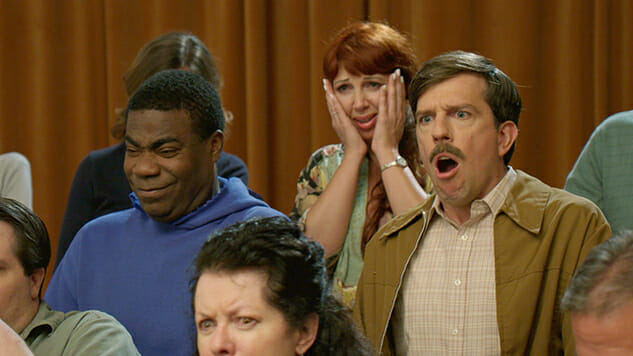The Clapper
(2017 Tribeca Film Festival Review)

You can feel how much Ed Helms believes in The Clapper. He strains himself, wringing melancholy from the long-suffering loser he’s so adept at portraying. Yes, Eddie Krumble is a professional crowd member directed to laugh, clap and question along with the script during infomercials, shopping shows and other low-budget TV. It requires him, with his friend Chris (Tracy Morgan), to dress differently on each shoot, shuffle meekly to pick up their meager checks and cower before the might of the SAG-only craft table. Clapping, we find, is perhaps the lowest form of acting. But Eddie’s happy with it: He’s unambitious, content to live his small life perfecting his stodgy delivery of fed lines, which in show business makes him a weirdo. The Clapper is just so boring and corny that all the audience can do is either feel bad for Helms or disingenuously applaud his unsuccessful efforts, mimicking his character’s chosen vocation.
Eddie’s content to get gas, five bucks at a time, from the same gas station just to see attendant Judy (Amanda Seyfried), a person similarly trapped in life but oddly OK with it. She sits in a glass box all night, communicating via intercom, watching the nightlife, making the best out of a bad situation. At least, that’s what she tells us. The film doesn’t trust anything to Dito Montiel’s directorial talents, so we hear each conversation, emotion or implication’s true intention. This is a film built around nuanced descent and emotional malaise stemming from the consequences of fame—something Eddie discovers when his costumed clapping is picked up as a recurring bit on a late night talk show.
Aside from the silliness of this premise (finding a specific infomercial extra that is doing the same job as everyone around him), the overblown cruelty of the search gets old fast. Every exterior shot tilts up to reveal a Find The Clapper (as the show has dubbed him) billboard or poster, their presence in the back of every shot not part of an intense, propagandistic fearfulness on the director’s part, but instead just a thoughtless bit of hamfisted set dressing. It’s as if Eddie’s being pursued by these props, running from his vague new fame, but their ubiquity is a joke we’re supposed to feel bad for laughing at. Instead, it’s all just uncomfortable and gets old fast.